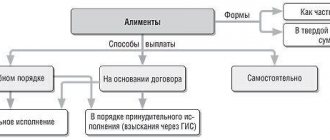One of the forms of placing children into a family is adoption. This is a very complex process that involves careful vetting of the family.
After all, it is necessary to protect the interests of the child by eliminating the possibility of crimes being committed against him. Therefore, potential adoptive parents undergo a rigorous selection process.
Accordingly, this topic often concerns the behavior of adoptive parents, not adopted children. Meanwhile, the family’s fulfillment of responsibilities towards the child imposes serious responsibility. And many cannot stand it, wanting to stop adoption. Termination is also possible for other reasons.
In any case, there is a refusal of adoption. These cases are not uncommon in law enforcement practice. Therefore, the question of how to abandon an adopted child is very relevant.
Can a person abandon an adopted child?
As a rule, the cancellation of adoption is initiated not by the adoptive father, but by completely different persons. In this list:
- the child himself upon reaching 14 years of age;
- representative of the prosecutor's office;
- employee of the guardianship and trusteeship authorities;
- second adoptive parent (most often ex-wife);
- biological father or mother of the adopted child.
Anyone from this list can file a claim in court, supplementing it with relevant documents and receive satisfaction on all points of the claim. But it is worth remembering that, first of all, the court acts in the interests of the child. The procedure is regulated by Article 140 of the Family Code of Russia.
Articles on the topic (click to view)
- What to do legally if a mother does not pay child support
- Legal assistance to orphans
- Fixed child support under the new 2020 law if the father works
- Form of agreement on payment of alimony for a minor child: sample 2020
- Conditions and documents for obtaining a land plot for a third child in 2020 in Moscow
- Conditions for receiving and amount of maternity capital for a second child after 2020
- Federal Law 159 on additional guarantees for social support for orphans
The man himself, who is going to cancel the fact of adoption, can do this only in two cases. Firstly, if he and his adopted son or daughter have completely lost mutual understanding. If the child does not consider him an authority, is insolent, aggressive towards the adoptive father, in a word, the normal process of upbringing will no longer be possible to restore. And, secondly, if a stepson or stepdaughter is diagnosed with a genetic or mental illness, about which the adoptive parent was not informed before signing the documents. The chances increase if the very nature of the disease prevents one from raising a full-fledged member of society (an example would be mental retardation of any degree in a minor).
On what grounds can an adoption be cancelled?
Initiation of cancellation of adoption by third parties occurs for the same reasons as deprivation of parental rights. These procedures are almost identical. The reasons may be as follows:
- Child abuse, sexual harassment, regardless of age (before reaching adulthood) and gender. Humiliation of the individual, both moral and physical.
- Inadequate fulfillment of parental responsibilities, lack of seasonal clothing and shoes, monitoring of academic performance and school attendance, proper nutrition, as well as appropriate treatment if the child is sick.
- Chronic alcoholism, drug addiction, substance abuse of the adoptive parent. But the diagnosis must be officially confirmed by a narcologist, and the patient must undergo treatment repeatedly in the appropriate institution. Another reason may be the confirmed incapacity of the adoptive parent.
If compassionate neighbors, relatives, or acquaintances see the situations described above and want to help the baby, they can contact the guardianship and trusteeship authorities, and their representative, in turn, initiate the procedure for canceling the adoption.
The child himself can ask for help. He can do this by coming to an appointment with a juvenile affairs inspector or an employee of the guardianship and trusteeship authorities. The child can contact the latter directly during the check visit, which are mandatory to monitor the standard of living of the adopted child. Representatives of the service are required to draw up a report and record complaints. The child must be over 10 years old.
Will I have to pay child support if the adoptive father cancels the adoption?
When the adoption is cancelled, all legal relations between the guardians and the minor are terminated, and the latter’s legal relations with his biological parents are resumed.
Of course, this is only possible if it suits the interests of the baby. If the adoption is cancelled, alimony may be collected from the adoptive parents according to the general rules. The recovery procedure can be voluntary or judicial.
Procedure for canceling adoption
Abandonment of an adopted child by a father is carried out exclusively in court. However, in any other case the process is exactly the same. The plaintiff submits a corresponding application to the court at the place of actual residence of the child. The document must indicate the reasons why the adoption should be declared invalid; in fact, a requirement for such a step and references to articles of legislation according to which this should happen.
Documents must be attached to the application (their list should be indicated at the very end). The court will accept the claim for consideration or refuse to accept it, indicating the reasons. During the review process, the judge may request additional documents, order examinations and studies, listen to testimony, including from the child himself, as a citizen of Russia, provided that he is over 10 years old.
Based on the information collected, the judge will make a decision, and as soon as it comes into force (if the issue is resolved positively), he will send an extract from the decision to the Civil Registry Office within three days. In accordance with it, the Civil Registry Office will make the necessary changes and issue the child a new birth certificate. At this point, the process of abandoning an adopted child can be considered complete.
Documents required to submit an application to the court
The statement of claim, or rather the facts set out in it, must be confirmed using the following list of documents:
- the plaintiff’s passport, if he is one of the adoptive parents;
- adoption certificate;
- child's birth certificate;
- evidence that confirms that the child behaves negatively towards the adoptive parent, which was the reason for filing the claim. This could be witness testimony, medical reports that recorded beatings of varying degrees of severity, police reports;
- a medical report that confirms that the child has a genetic or mental diagnosis that prevents him from raising someone else’s child into a full-fledged member of society. In the latter case, it will be necessary to prove that the plaintiff was not aware of the diagnosis at the time of adoption;
- a medical report on the diagnosis of the adoptive parent, regarding whom the adoption cancellation procedure is being carried out, if it was initiated by the guardianship and trusteeship authority, the prosecutor's office, the second adoptive parent, biological parents or the child himself. This could be chronic alcoholism, drug addiction, substance abuse or mental illness. The doctor should mention that the patient is incurable;
- other documents that the court will require at the beginning of the consideration of the case.
The statement of claim itself can be drawn up in any form, but the applicant must adhere to the sample, which he can always find in the court office.
Package of necessary documents
The basis for the trial is the following materials:
- documentary evidence of all the facts stated in the claim;
- certificate of marriage or divorce;
- duty payment receipts;
- characteristics of the parents;
- baby's birth certificate.
Reasonable justification for refusing paternity are the following:
- honey. a certificate certifying the inability to have children;
- evidence regarding the absence of the father at the time of conception;
- confirmation of the wife’s relationship with another man;
- conclusion of DNA testing.
Subtleties and special conditions for invalidating an adoption
Refusal to adopt a stepchild is possible only until the age of 18, that is, until the child reaches adulthood. After this date, it will be impossible to break the relationship between the adoptive parent and the adopted child.
The responsibilities of an adoptive parent are absolutely similar to those of biological parents. Refusal to adopt only removes the rights of the adoptive father, but not the obligations. He will also be obliged to pay alimony, if necessary, the adopted child becomes a first-priority heir on a par with adopted, but not abandoned or natural children, he has the right to receive a share of housing and participate in the privatization process until he reaches adulthood.
This is important to know: What documents are needed to file for divorce if there are children?
Only a counterclaim from a former spouse and the adoption of a child by another person can exempt you from the mandatory payment of alimony. If the former adoptive parent is not the initiator of invalidation of the adoption, the court may not oblige him to make alimony payments. If a child is taken away by the guardianship and trusteeship authorities, the former adoptive parents still pay alimony for his maintenance until he reaches the age of majority or until he is adopted by another family.
The opinion of a stepchild who is already 10 years old, but before reaching adulthood, is mandatory for consideration at the trial. During the conversation with him, representatives of the prosecutor's office and bodies for the protection of the rights of minors, a teacher or child psychologist, as well as the second adoptive parent (provided that he remains an adoptive parent) must be present. Alternatively, representatives of the guardianship and trusteeship authorities can talk to him at his home, in a familiar environment, so as not to traumatize the child’s psyche. At the end of the conversation, a special report and conclusion of the social service worker who conducted the survey are drawn up. These documents will appear in court as the opinion of the minor orphan.
As a rule, experienced lawyers always insist on a thorough study of the adoption procedure once carried out. Was consent given by the child himself earlier and did it meet all legal requirements regarding age, intellectual and physical development? Whether there was mutual consent of the biological parents, provided that it was required at all. Whether the adoptive parent was truly aware of his actions and intended to assume the responsibilities of a parent. Wasn't the very fact of adoption fictitious? Are there any false documents or forged signatures in the adoption case? Have all permissions been obtained to complete this step? All this will greatly facilitate the search for an answer to the question of whether it is possible to reliably abandon an adopted child. If at least one condition is not met, the adoption can be declared invalid automatically.
If the cancellation of the adoption is contrary to the interests of the child or the ex-wife is categorically against invalidating the process, the claim will most likely be denied.
Possible initiators
How to abandon an adopted child? According to Art. 140 of the RF IC, such a procedure is carried out only through the court. Below is a list of those citizens who have the right to demand cancellation (Article 142 of the RF IC):
- Biological parents (provided that they have not been deprived of parental rights by a court decision).
- Adoptive parents.
- A child adopted into the family who is 14 years old.
- An employee of the PLO or the prosecutor's office (the defendants will be the adoptive parents).
Possible initiators of this process can also be people who are not indifferent to the fate of the minor (neighbors, relatives, teachers). They should contact the PLO or the prosecutor's office.
To carry out the cancellation procedure, adoptive parents must file a claim with the district court. The rights and interests of the minor will be protected by representatives of the PLO. Until the appropriate court decision is made, refusal of adoption is unacceptable.
Consequences of invalidation of adoption for both parties
If the court satisfied the plaintiff’s demands and declared the adoption invalid, the following consequences occur:
- Family ties with all their rights (on the part of the adoptive parent) and obligations (on the part of the adopted child) cease from the moment the court decision enters into legal force.
- The child will be returned to the biological parents, and if this is impossible (they are deprived of parental rights) or is contrary to the interests of the minor, to the guardianship authorities to further decide his fate. If the claim was filed by the ex-wife (husband), that is, the second adoptive parent, the child remains with him.
- The child’s personal data (last name/first name/patronymic) will be changed at his request (if he has reached 10 years of age).
- If the initiator of the invalidation of the adoption was the person who is withdrawing from participation in the child’s life, he will be forced to pay alimony for the maintenance of the minor. The calculation procedure is exactly the same as when claiming payments for natural children.
- When trying to adopt or re-adopt someone, the initiator of the termination of adoption will not be able to do this. He will be on the “black list” of adoptive parents. If the initiative was not on the part of the person who was deprived of the right to be called a foster parent, he can try to become one again, but not earlier than 6 months after the end of the process.
- The former adoptive father or mother will be required to pay child support until the child reaches 18 years of age, or 23 years of age, provided that he or she is studying at a stationary department of a higher educational institution. But the adopted child himself will be released from the obligation to in any way support disabled former adoptive parents.
Thus, the most common goal of men (less often than women), the opportunity not to pay alimony, by declaring the adoption invalid, becomes practically unattainable. Only the rights are removed; the obligations of paternity towards the minor remain.
The amount of alimony payments can be reduced only if the former adoptive father or mother remarries and has other children.
Why is it better to hire an experienced lawyer to handle the process?
Judicial practice proves that any hearing that involves children, especially adopted children, is extremely difficult. An amateur who does not know the latest changes in legislation risks losing the process. Moreover, he may simply not see a simpler solution to the problem, while an experienced lawyer is in full control of the situation. But you should look for a professional who specializes in family matters. In this case, a narrow specialist is preferable to a generalist lawyer. He will correctly assess the situation, warn about possible risks, and will also be able to act as a representative at court hearings, saving time and nerves.
Is it possible to abandon an adopted child after a divorce?
The procedure for adopting a child from an orphanage is much more complicated than when adopting a child of a second spouse on the basis of legal marriage. The difference is that in the second case there is no need to search for the adoptee in the database, the guardianship authorities do not draw up a conclusion about the possibility of the stepfather (stepmother) to be an adoptive parent, there are no restrictions related to the need to own residential property and the difference in age (Articles 127, 128 RF IC).
In judicial practice in cases of cancellation of adoption, it is customary to be guided by Resolution of the Plenum of the Armed Forces of the Russian Federation No. 8 of April 20, 2006, where in paragraph 19 the reasons for a possible refusal are specified in detail:
- Failure by persons who formalized the adoption to fulfill parental responsibilities related to raising a child and creating comfortable living conditions for him.
- Adoptive parent's abuse of alcohol and drugs.
- The use of harsh methods of education, involving the use of physical violence, emotional pressure, and intimidation.
- Lack of mutual understanding between the adoptive parent and the child due to circumstances not related to the guilty behavior of the adoptive parent; lack of authority in the eyes of a minor, constant misunderstandings that negatively affect the psychological development of the adopted child.
- The presence of serious deviations in the child, identified after paternity (maternity) was registered, which are an obstacle to the further maintenance and upbringing of the minor in the family and about which the adoptive parents were not warned.
In other cases, minors who have reached 10 years of age are heard by a judge. The process determines how prepared the child is for the loss of his parents, whether he wishes to remain adopted, and whether the information provided by interested parties is reliable.
Common reasons why one or both parents refuse to adopt
Depriving a child of one or both parents who abandon him during a divorce creates sad statistics. The reasons that provoke parents to commit an unsightly act come down to the following:
- a child from an orphanage was taken by one of the parents, for example, by the husband, and after the divorce the woman refuses to have common ties with both her husband and the adopted child;
- the couple was unable to reach complete mutual understanding with the minor, feelings of fatherhood and motherhood were not awakened, and after the divorce, the adopted child became a burden;
- children did not fit into the concept of a new life after divorce;
- the spouse does not want to bear financial responsibility for a child who is not related to him by blood.
No matter how such actions are condemned by society, abandonment of adopted children after divorce is not uncommon.
Is it possible to renounce paternity after adoption?
The court often receives lawsuits from people who adopted their wife’s children, and after a divorce want to refuse to adopt a step-child. A change in marital status will not be grounds for breaking family ties.
During the trial, an additional review of the conditions of detention of the minor is usually ordered. Representatives of educational organizations, psychologists, and teachers take direct part in it. Refusal of a previously adopted child by the father requires compliance with the following algorithm of actions:
- Mandatory filing of a claim in court.
- Payment of state duty: 400 rubles.
- Providing documents proving the applicant’s position.
- Ensuring the attendance of witnesses (if any) at the court hearing.
- Providing compelling reasons regarding the current situation.
How to cancel the adoption of a child during a divorce
If there are grounds for canceling the adoption, and the adoptee is under 18 years of age at the time of refusal, the adoptive parents have the right to go to court. When a child reaches the age of majority, cancellation of adoption is possible only with his consent with the support of his parents and adoptive parents.
This is important to know: Getting an apartment for orphans: what documents are needed
The following may apply for cancellation of adoption:
- Persons who have registered the right to be the parents of a minor.
- Half-blooded mother or father, unless they are incapacitated and not deprived of parental rights.
- Representatives of government bodies: guardianship and trusteeship, courts (prosecutor). Third parties initiate the process if alarming signals are received from concerned neighbors, relatives or other persons about existing offenses against a child, and the applicants have evidence of infringement of the rights and freedoms of children in the family.
- The child himself, if he is 14 years old at the time of application.
If the main reason for a couple's request to abandon children is divorce, the judge in rare cases makes a positive decision.
Algorithm of actions
Having decided to cancel the adoption, you need to adhere to the following algorithm of actions:
- Find out whether there are grounds for canceling the adoption.
- If there are reasons for abandoning the child, go to court. The consideration of such cases is within the competence of the federal city court; Armed Forces of the Republic; courts of the autonomous district, region; courts at the place of residence.
- Prepare documents and file a claim.
- Appear at the hearing of the case in court and receive a decision to cancel the adoption.
Preparing and filing a claim
If one adoptive parent in a lawsuit demands to deprive the status of a parent of the second adoptive parent, then the first will be the plaintiff, and the second will be the defendant. If both parents act as plaintiffs, wanting to cancel the adoption, the defendant is the child, acting with the support of the prosecutor, guardianship and trusteeship authorities.
The application to the court is drawn up in accordance with the rules set out in Art. 131 Code of Civil Procedure of the Russian Federation, and contains:
- name of the court, its location;
- indication of the plaintiff, defendant, third parties;
- information about the adoptive parents (if there is only one adoptive parent, then about the blood parent and the legal parent);
- the main part, which describes in detail the circumstances of the case: when the marriage was concluded and dissolved, who initiated the adoption of the child, for what reasons the cancellation occurs (attach evidence);
- petition for cancellation of adoption; list of applications;
- date and signature.
Sample claim for cancellation of adoption:
The following documents must be attached to the claim:
- copies of the claim according to the number of interested parties;
- a copy of an identity card, divorce or marriage certificate;
- a copy of the birth certificate;
- evidence of the child’s illness, evasion of parental responsibilities or other circumstances allowing the refusal of adoption.
Procedure
The process of cancellation of adoption is subject to supervision by the prosecutor's office, guardianship and trusteeship authorities. The reliability of the provided grounds for initiating a trial is subject to mandatory verification, witnesses and interested parties are questioned, and the living conditions of the minor are checked.
At the same time, the question of whether the child will retain his last and patronymic names is being decided, and whether the parents will be required to pay benefits in accordance with Art. 81, 83 RF IC.
Deadlines
For consideration of a civil case in accordance with Art. 154 Code of Civil Procedure of the Russian Federation is allotted 2 months. It will take another 1 month for the decision to cancel the adoption to come into force.
If any additional examinations are required, the period will be suspended for the duration of additional activities and then resumed again.
Expenses
Additional costs are usually associated with the provision of legal services. Their size is negotiated individually.
Nuances, consequences
Parents whose adoption has been canceled are most interested in the legal consequences of the procedure. After the court decision comes into force, the following happens:
- the rights and obligations of children and parents in relation to each other are canceled;
- the minor is deprived of his previous surname and patronymic or leaves them at his own discretion (the opinion of children is taken into account when they reach 10 years of age);
- the minor is returned to his parents (if there is such a possibility) or to the guardianship and trusteeship authorities.
Abandonment of an adopted child. Can it be prevented?
11.03.2015
Statistics show very large numbers of adopted children being returned by adoptive parents back to orphanages. Why do good intentions turn into tragedy and is it possible to prevent the abandonment of a child, which causes another, almost irreparable trauma? We are talking about this with the psychologist of the Center for Family Placement of Children at the Marfo-Mariinsky Convent, Lidia Vladimirovna Golubeva.
– Lidia Vladimirovna, tell me, what is the main reason for the adoption of a child by adoptive parents after adoption?
– Among the most common reasons is a lack of understanding that adopted children are special because they experienced severe trauma when they separated from their natural parents. In the future, this leads to disturbances in the emotional plane, which subsequently extinguishes the intellect and their cognitive activity. Many adoptive parents do not imagine this problem. They perceive the adopted child as ordinary; what he actually feels is unknown to them. Therefore, the child’s inappropriate behavior often causes some shock. But why he behaves this way at all - the child himself will never be able to explain.
We analyze all such situations in detail in our courses at the Orthodox School of Adoptive Parents at the Center for Family Placement of Children. After all, it is often the lack of necessary knowledge that leads to the fact that parents cannot cope. And something happens that brings even deeper trauma for both the child and the adoptive parents - refusal.
– How can professional help prevent refusal?
– Parents should not be afraid to seek help and be open! Often a conversation with a priest or Orthodox psychologist helps to find the right solution. Sometimes it’s very difficult to figure out what to do in what situation. Now in Moscow there are many good adoption centers where you can resolve issues with specialists. During the courses, they tell you what problems a parent may encounter. And during such activities, parents at least understand that everything is not simple. In our courses, there were cases when parents themselves abandoned the idea of adoption, because they realized what a responsible and difficult step it was. We consider this an important result: if they realized in time that they could not take on such responsibility, this is already good.
– Is there a particularly difficult time during adoption that could lead to a tragedy like this?
– The most important thing is to survive the first year, it is the most difficult. In the first months, a child can behave very well in order to be liked. And then the “withdrawal” begins - he begins to check whether his new parents really love him. He had already been abandoned by his mother once, and now he had accumulated distrust in the world, in the fact that someone could love him. He can test this love with bad behavior or some other means. We have crossed a painful threshold - and normal life begins, getting used to each other. Then things will get easier, joint events and family holidays will begin. All this holds together, attachment appears. But it takes time to get to this point. At the very first difficulties, you need to understand that they are natural.
I repeat: the child is not to blame for the way he behaves. Most likely, his behavior should be like this during this period. He was once abandoned, now it is difficult for him to trust anyone. It is unclear to him how his life will turn out next, whether he will be abandoned again or not. Children often have the association that their adoptive mother is the mother who abandoned them once. Problem behavior is very often associated with this. Ordinary people may not understand a lot. Experts know this, so it is advisable not to go through this difficult period alone.
– They say that everything can be covered with kindness. But adopted children often respond to affection with even greater aggression. Can't you be too kind? How to find the middle?
– In relationships, boundaries are definitely needed, especially if the child is aggressive. Some things need to be strictly suppressed. But you must always remember that the child is not to blame for such behavior. Most likely, the people who once showed him this way of communication are to blame. But we shouldn't even blame them. No matter how bad the blood parents are, they will remain so. There is a myth among adoptive parents: they often think that they will completely replace their real mom and dad. Of course, in some ways they will replace them, but be that as it may, every child has a natural mother who gave birth to him. He still loves her. And there is absolutely no need to reproach the former orphanage in your hearts: “I took you in, and you, ungrateful, behave like this.” In fact, children do not owe us anything, and we must firmly remember this. Under no circumstances should you demand self-love from them. Often parents are subject to a stereotype: they say, now I will take him, the poor one, and help him, and then he will be so grateful to me, in his old age he will take care of me. However, life is more complicated than our plans. There may be no return at all, and you need to be prepared for this in advance.
– Okay, but someone will ask, why take an orphan at all?
– To help this particular child. And most of the parents who refused tried to solve their problems with the help of their child. The most common motive is that they don’t have children of their own. It turns out that they take him more for themselves, and not in order to help him. Of course, they will help him too, but it’s bad if the main motive is selfish. It happens that parents whose child has died come to us. They are trying to replace a dead child. But another child is a different person. From a lack of understanding of all this, problems again arise. Ungrateful? But he doesn’t know how to do it any other way, no one taught him or showed him any other way. Childhood trauma has led to various behavioral abnormalities. In addition, parents often try to protect their adopted child from his entire past life, as if his natural mother did not exist at all, and if she did, then she is the worst. The child absorbs the broken structure of the relationship - and problems begin. With adoptive parents, over the years, the “we’ve put our whole life on you” approach can become more and more evident. But you need to take a child not for yourself, but for him. To help this little man find a family. The well-known phrase that no matter how good an orphanage is, it will never replace a family is always relevant. The existence of a person outside the family is not normal. Our main goal is not to make this child ours. Although it is very good if he responds to your love. But this should not be the main goal, we do not have the right to assign anyone to ourselves, the child just needs to be loved.
– What to do with punishments for an adopted child? After all, they can push him away from his adoptive parents. After all, if you don’t punish and forgive everything, he can sit on your neck?
– There is never too much love. But impunity is not love, but connivance. I worked in an orphanage for many years, and I always felt that if you punish fairly, if you calmly explain why, it does not cause injury to the child. You need to punish for a specific action, without rejecting the child. Children have a keen sense of justice.
– How can parents with natural children make sure that their adopted child does not feel like a stranger? I know a family who, having three children of their own, adopted a fourth. The adopted son then constantly repeated: “I’m not your family, that’s why you treat me worse than others.” Although in fact everything was the other way around: the adoptive parents infringed on their own children in many ways for the sake of the adopted one, but could not prove anything to him.
– Provocations happen when a child tries to manipulate you. Probably, you should not give in emotionally, and every time a conflict arises, calmly answer: “No, I give everyone equally. You are dear to me, you are ours. I love you just like everyone else." Natural wisdom is needed here. I would like to note that orphanages are naturally strong psychologists. Life forced them to be like this. And you need to have reason with them, you need to know all their features. The parent's heart must be open, and there must be love in it, but everything must be reasonable. Taking a child from an orphanage is, of course, a decision. But you need to think carefully, because this good deed is very difficult. The main thing to be wary of is how not to cause even greater injury to the child.
– If the adoptive parent is too kind and gentle a person, will he be able to cope with these problems?
– A soft person or a strict one – it doesn’t matter. The main thing is to establish contact. And then intimacy and affection will appear. If your child is comfortable, interesting, and exciting with you, everything will work out. But there is no general recipe for how to avoid refusals. It happens that parents are very good, but the child feels bad with them. Everything is very subtle here. There are difficulties, but when happy and joyful mothers and fathers come to us, it warms the soul. Another little man found a family.
– Have there been any near-failure situations at our Adoption Center? Did you manage to avoid it?
- We have. Now we are also counseling a complex family. But, thank God, it doesn’t go to extremes.
– The Orthodox Center for Family Placement of Children at the Marfo-Mariinskaya Monastery has existed for more than three years. How many children were adopted during this period?
– To date, 36 children have been adopted. Some parents are in the final stages of preparing documents. But we don’t push anyone, we don’t rush anyone. The decision is up to the adoptive parents. People must evaluate their strengths.
Elena Verbenina
Arbitrage practice
Citizen S. filed a claim with the district court to cancel the adoption of his son under 18 years of age.
In the claim, S. indicated that his wife’s son was adopted by him at the age of 5 years, as evidenced by the entry in the registry office, the child was given the surname and patronymic of the adoptive parent. The relationship became tense; 4 years after marriage, S. left his wife and for 2 years did not maintain a relationship with her and did not take part in raising his son. S. noted that the adoptee does not consider him family and does not want to maintain communication, so S. asks the court to cancel the adoption. The plaintiff pays alimony and does not renounce the assigned responsibilities, but believes that the cancellation of the adoption should exclude the adoptee’s claims to his property.
The defendant did not agree with the judgments of her ex-husband. She noted that a family relationship had developed between her son and S., the son learned about the presence of another biological father only at the age of 11, and if he loses a parent again, this will cause irreparable trauma to the child’s psyche. In addition, the plaintiff and the defendant have a common son, the brothers are friendly, and if the father pays attention to only one, the children’s relationship may become tense.
The guardianship authorities conducted an examination, during which it was determined that the son considered S. to be his father, and the cancellation of the adoption would negatively affect the emotional state of the child. Taking into account all the circumstances, the court did not satisfy the claim to cancel the adoption.
Questions and answers
- My husband and I divorced in 2020. The ex-husband wants to refuse to adopt a daughter from his first marriage so as not to pay child support. Will he be able to do it? Lawyer's answer: the spouse can formalize the refusal of adoption by going to court, but he cannot refuse to pay alimony, since his rights in relation to the minor will cease, but not his obligations.
- We adopted a baby from an orphanage, but during the divorce we filed a cancellation of the adoption. Now this child is already an adult, and I am wondering whether, due to his inability to work, I can receive financial assistance from him? Lawyer's answer: no, because when the adoption is canceled, mutual rights and obligations cease in accordance with Art. 143 RF IC.
- My stepfather adopted me at the age of 3, and 10 years later he divorced my mother. While married, he was rude, intimidated, and treated me cruelly. Now I’m 18, I want to return my mother’s last name and refuse to adopt him, so that he ceases to be the father in the documents. Is this possible? The lawyer's answer: yes, but only with the consent of the stepfather, mother and your biological father.
Rash decisions lead to personal tragedies, and the worst is when the main characters are children. But if this is the case, lawyers from ros-nasledsvtvo.ru will help you get into the situation and understand the intricacies of the process.
Sometimes adoption occurs thoughtlessly, for example, trying to win the favor of a woman, the stepfather promises to adopt her daughter or son, treating the child with indifference or feeling hostility. In such cases, the cancellation of adoption is a good thing. Another situation is the abandonment of the child by both adoptive parents. This decision should be approached with maximum responsibility, trying not to miss the slightest opportunity to raise a child in a family, albeit an incomplete one.
FREE CONSULTATIONS are available for you! If you want to solve exactly your problem, then
:
- describe your situation to a lawyer in an online chat;
- write a question in the form below;
How to abandon an adopted child in Russia?
The law establishes the right of a minor to family upbringing. In the absence of blood parents or one of them, the child can be adopted. By court decision, the foster parents and the minor become one family. However, during the period of living together, difficulties may arise that make further residence impossible. Let's look at how to formalize the abandonment of an adopted child.
Legal consequences of refusal
If the court decision is positive, the adoption will be terminated. According to the Family Code, the following changes come into force:
- Mutual rights and obligations between the adoptive parent and the adopted child cease.
- He can be returned to his natural parents (if parental rights are assigned to them) or to employees of the Public Educational Institution for his further placement in an orphanage or a new foster family.
- The issue of preserving/changing the child’s previous personal data is being resolved. If he is already 10 years old, his opinion plays an important role. A court decision is made to change the information about the parents to the previous ones.
- By a court decision, adoptive parents may be required to pay child support until the child reaches adulthood. The share of the former adoptive parents' real estate may remain assigned to him.
Cancellation of adoption
Adoption is a form of child placement in which the child and adoptive parent are given the rights and responsibilities of an official birth family.
Types of adoption:
- intra-family (the husband adopts his wife’s child from her first marriage);
- strangers (applies to orphans).
Adoption is a serious process. It is established by court decision. Depending on the type of adoption, the reasons for its cancellation vary. For intra-family reasons, the main reason is the divorce of parents. After which, the adoptive parent often wants to get rid of parental responsibilities in relation to his wife’s child.
This is important to know: Rights and amount of benefits for guardians of incompetent disabled people of groups 1 and 2 since childhood
The reasons for canceling the adoption of orphans are:
- divorce or illness of adoptive parents;
- lack of parent-child contact;
- improper performance of duties by adoptive parents.
It is important to know! There is no possibility of administrative abandonment of an adopted child. The issue is regulated exclusively through the courts.
What rights does an adopted child have?
Parental rights and responsibilities apply to both natural and adopted children - both during marriage and after its dissolution. An adopted person after the divorce of his new parents has the following rights:
- for financial support and support;
- upbringing;
- protection, including protection from infringement or restriction of rights as a result of adoption;
- relations with adoptive parents;
- other rights presented to the RF IC.
Is it possible to abandon an adopted child?
The cancellation of adoption is provided as a protection of the rights of the child from improper performance of duties by the adoptive parents. However, the procedure is often used by citizens to abandon a child.
If the initiator of the process is the adoptive parents, they must prove in court the validity of the reasons for abandoning the child. The court will satisfy the requirements if there is a serious evidence base. The following will be taken into account as valid reasons:
- the minor has a serious illness, information about which is not included in the medical report of the child being adopted (oncology, HIV);
- identification of a serious illness in one of the adoptive parents that interferes with the fulfillment of parental responsibilities (Government Decree No. 117 of 2013);
- dissolution of the marriage between adoptive parents;
- the presence of child-parent conflicts.
To satisfy a claim for cancellation of adoption in the presence of child-parent conflicts, the consent of both the adoptive parents and the child aged 10 years or older will be required.
Who can demand cancellation of adoption?
The law limits the list of citizens and organizations that can initiate the process of canceling adoption. The application can be submitted:
- adoptive parent;
- blood parent;
- child, aged 14 years and older;
- district guardianship department;
- district prosecutor's office.
The application can be submitted either by one adoptive parent or by a married couple jointly. The law provides for the possibility of canceling an adoption in relation to only one of the foster parents.
A natural parent may apply to the court to cancel the adoption to protect the rights of the child:
- if the minor does not want to live with a foster family;
- in the absence of mutual understanding between the adoptive parents and the child;
- when cases of ill-treatment are discovered.
A minor child over 14 years of age can independently initiate the process. However, it is advisable to seek help from the district guardianship department or the prosecutor's office. Specialists will help you draw up a statement of claim and provide accommodation and support for the child during the trial.
Voluntary renunciation of paternity
The easiest way is to renounce the parental rights of the father or mother on a mutual basis. But even in this case, the procedure is formalized in court. This is common in the following cases:
- the child's mother knows that her ex-husband is not the biological father;
- The woman already has a new family, where the upbringing of children is entrusted to another man.
Some other cases are also possible, but are much less common. When wondering how to give up a child to a father after a divorce, it is important to understand that when removing this responsibility from one person, it must be transferred to the shoulders of another, otherwise the court will refuse to satisfy such a petition.
If a man wants to lose his parental rights voluntarily, he needs to talk with the person who wants to adopt the child and discuss the intricacies of the procedure. If there are no objections, you must go to court. The claim can be filed by the mother, legal or biological father. At the trial there will be guardianship authorities and a prosecutor to monitor compliance with the rights of the minor.
How is adoption canceled?
Let's consider how a citizen who wants to formalize a refusal of adoption needs to act. Procedure:
- Rehabilitation (for orphans);
- Collection of documents;
- Drawing up an application;
- Trial;
- Getting a solution.
Before the start of the trial, it is advisable to resolve the issue of the whereabouts of the child for the period of the proceedings.
Rehabilitation
Lack of contact between the child and the adoptive parent is not in itself a reason to cancel the adoption. The law provides for the need to contact the district guardianship department and the support service for foster families to undergo rehabilitation. The support process includes the use of the following measures:
- psychological support for parent and child;
- social support for the family;
- temporary placement of a minor in a rehabilitation center.
The adoptive parent may refuse to be accompanied. To do this, you must submit a written application to the guardianship department.
If the foster parent does not inform the authorized bodies of the existence of a crisis situation in the family, but immediately files a claim in court, the application may be refused. If there is no direct threat to the life and health of the child, the court will decide to save the family.
In case of intra-family adoption, the citizen is exempt from the obligation to notify the authorized bodies and undergo crisis support. Often, the cancellation of intra-family adoption takes place in one meeting.
Statement of claim: contents
The statement of claim must be drawn up correctly, taking into account specific requirements.
- Full name of the judicial authority where the documentation is submitted.
- Personal information of the applicant and respondent.
- Information about the employee of the prosecutor's office, PLO.
- Circumstances of the procedure: information about the court decision, its date and number.
- A request to refuse adoption with reference to the provisions of the law that allow this procedure to be carried out.
It is necessary to have a signature and a date of registration, which must coincide with the date of filing the claim. Otherwise, the statement of claim and attached documentation will not be accepted for consideration and will be returned to the applicant for revision. Contacting a professional lawyer will help eliminate possible mistakes.










